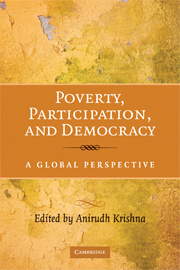Book contents
- Frontmatter
- Contents
- Preface
- Contributors
- Poverty, Participation, and Democracy
- 1 Introduction: Poor People and Democracy
- 2 Poor People and Democratic Citizenship in Africa
- 3 Do Poor People Care Less for Democracy? Testing Individual-Level Assumptions with Individual-Level Data from India
- 4 Inequality and Democracy in Latin America: Individual and Contextual Effects of Wealth on Political Participation
- 5 The Poor and the Viability of Democracy
- 6 Conclusion: Implications for Policy and Research
- Bibliography
- Index
- References
4 - Inequality and Democracy in Latin America: Individual and Contextual Effects of Wealth on Political Participation
Published online by Cambridge University Press: 14 May 2010
- Frontmatter
- Contents
- Preface
- Contributors
- Poverty, Participation, and Democracy
- 1 Introduction: Poor People and Democracy
- 2 Poor People and Democratic Citizenship in Africa
- 3 Do Poor People Care Less for Democracy? Testing Individual-Level Assumptions with Individual-Level Data from India
- 4 Inequality and Democracy in Latin America: Individual and Contextual Effects of Wealth on Political Participation
- 5 The Poor and the Viability of Democracy
- 6 Conclusion: Implications for Policy and Research
- Bibliography
- Index
- References
Summary
Seymour Martin Lipset in Political Man (1960: 28) made the classic statement that “most countries which lack an enduring tradition of political democracy lie in the underdeveloped sections of the world.” With respect to Latin America, the region of the world on which we focus, Lipset used numerous indicators of national wealth that led him to characterize Latin American nations as economically underdeveloped. He found that economic underdevelopment was associated with either unstable democratic government or dictatorship. He classified two-thirds of Latin American nations as stable dictatorships at the time of his study in the late 1950s. A special drag on democracy, he argued, was insufficient education. The effects of inadequate education, he argued, took their toll at the micro (i.e., individual) level, rather than at the level of nations as entities. Since that classic work was published more than forty years ago, numerous studies have tested the development–democracy link, and many (but not all) have confirmed it.
More recent work by Przeworski et al. partially refuted the relationship that Lipset uncovered, finding no impact of economic development on the probability of the inauguration of democracy (Przeworski et al. 1996). Nonetheless, that research did find that economic development is not, after all, irrelevant for democracy because Przeworski and his coauthors found that it has been a sine qua non for the survival of democracy once it is established. They demonstrate that democracies simply do not break down once they have surpassed a certain minimum economic threshold.
- Type
- Chapter
- Information
- Poverty, Participation, and DemocracyA Global Perspective, pp. 94 - 124Publisher: Cambridge University PressPrint publication year: 2008
References
- 11
- Cited by



